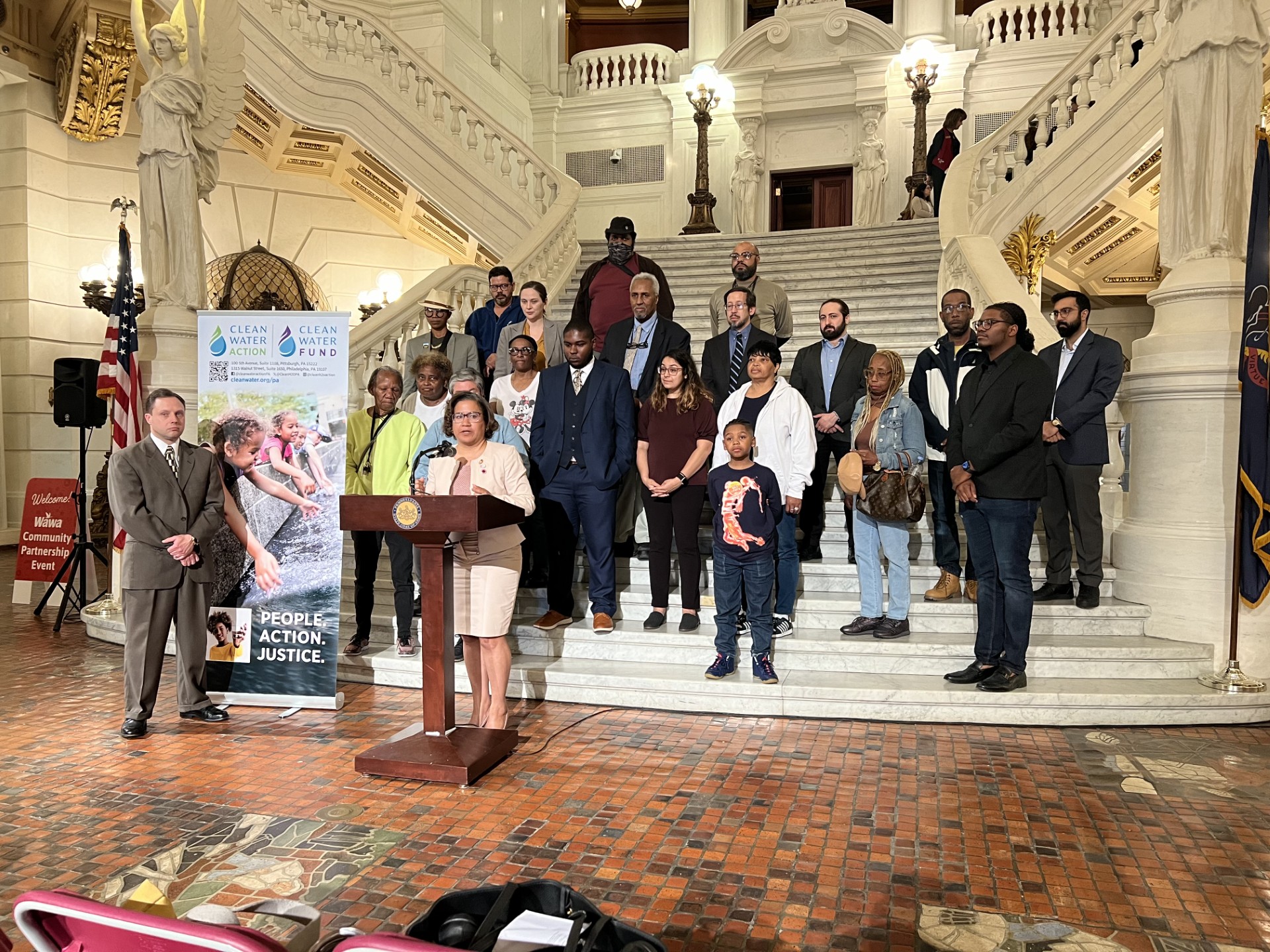
Democrat leadership urged to move and pass HB 652
(Harrisburg) – Clean Water Action, residents from environmental justice communities, supportive state representatives and allies from across the Commonwealth held a press conference to urge Democratic leadership to move HB 652. The press conference also recognized milestones in the growing support for HB 652 which included over half the Pennsylvania House Democratic Caucus signing on as co-sponsors, 55 organizations signing onto a letter demonstrating their backing , and the delivery to Governor Shapiro of nearly 600 individually hand written letters of support from residents.
“Governing demands our elected leaders step outside of their comfort zones to do what’s best for our communities which is why while we appreciate positions of support, more is needed from leadership to help HB 652 gain greater traction and ensure its successful advancement through the legislature,” said Steve Hvozdovich, Pennsylvania Campaigns Director, Clean Water Action. “We need to send a message that we’re here for our low income and communities of color by seizing the opportunity we now have to move proactively toward creating meaningful avenues that help alleviate some of the unjust and disproportionate environmental burdens they face.”
Rep. Donna Bullock (D-Philadelphia) is the prime sponsor of HB 652 and worked closely with Clean Water Action to develop its language which is modeled on similar policies adopted in New Jersey, Minnesota and just recently Massachusetts. The bill would uplift environmental justice communities by requiring known polluting facilities seeking permits to build or expand in these communities to prepare a cumulative environmental assessment that includes potential negative impacts their operations may have on the broader area they’re operating in and empowering the Pennsylvania Department of Environmental Protection (DEP) to deny a permit application or require added stipulations for approval if it finds those impacts would further harm the health and environment of the community.
“Environmental racism is a longstanding issue in the commonwealth. Facilities that pollute the environment have been built in burdened communities without their consent because they lacked the influence to stop it. Enough is enough,” Rep. Donna Bullock said. “By empowering the DEP to deny a permit application if the environmental impacts are found to be too harmful and requiring DEP to consider public testimony, we are putting the power in the hands of the community, concluded Rep. Bullock.”
Roughly 2.3 million people live in 1,965 identified environmental justice areas, according to the DEP’s updated PennEnviroScreen tool which uses 32 determination indicators, including race, age, income, exposure to pollution and toxic emissions, and health conditions like asthma and cancer. Historically, the people in these communities live with hazardous conditions that potentially poison their water and air, impact their health, drive down their property values and prevent people from wanting to remain part of the community.
"Community members in Braddock, East Pittsburgh, and North Braddock spent 7 1/2 years protecting our neighborhoods from oil and gas development at U.S. Steel's Edgar Thomson plant,” said Edith Abeyta, North Braddock Residents for Our Future. The possibility of additional harms from fracking, high levels of PM 2.5, hydrogen sulfide, hydrogen dioxide, and lead in our water, homes, and air is just too much to endure. Our elected officials and the DEP have to put an end to sacrifice zones and environmental racism, concluded Edith."
"As a lifelong resident of Southwest Philadelphia, an area often overlooked and underserved, we face many challenges and setbacks as it relates to the environment, said Xeyah Martin. Our area is home to multiple dumpsites, junk yards, car dealers, warehouses, refineries, and neighbors Chester, PA where some of Philadelphia's trash gets incinerated. Each type of industry I just stated releases major environmental hazards in a primarily residential neighborhood. It's time to put the Commonwealth’s citizens first by ensuring any future sites being constructed have properly done studies and their due diligence before construction begins, concluded Xeyah."
Our environmental justice communities deserve better than investments that only perpetuate these cycles and force them into the false narrative that they must choose between jobs or their health and environment. An alternative vision was presented that calls for incentivizing community-centered solutions that will help environmental justice communities not only thrive economically but environmentally.
“Pennsylvanian communities deserve an economy that works for everyone” said Elowyn Corby, Mid-Atlantic Regional Director with Vote Solar Action Fund, “And we have the tools to make it happen. Instead of sacrificing the health and well-being of low-wealth communities and communities of color, we must prioritize community-centered solutions like local clean energy. This bill shows we’re serious about investing in community health and resilience, while building toward a shared vision of a more just and equitable society.”
HB 652 was voted out of the House Environmental Resources and Energy Committee last June. It also complements DEP’s updated Environmental Justice Public Participation Policy because it addresses some of the limitations DEP acknowledged during the policy’s comment period and creates the needed additional statutory authority they advocated for.
"With this legislation, we have the opportunity to bring justice to communities most impacted by environmental issues," Rep. La’Tasha Mayes said. "Pollution disproportionately affects Black Americans and with seven of the state's largest polluters in western Pennsylvania, we must address these disparities. With requirements to assess effects on the environment, we protect our environment."
Clean Water Action is a national 501(c)(4) environmental organization with nearly one million members nationwide. Since our founding during the campaign to pass the landmark Clean Water Act in 1972, Clean Water Action has worked to win strong health and environmental protections by bringing issue expertise, solution-oriented thinking and people power to the table. Learn more at cleanwater.org.